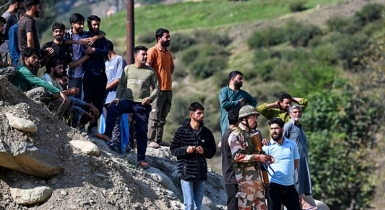We celebrate June 7 as Six-Point Day, observed on the seventh of every month. The "Six Points Demand" was introduced in 1966 by Bangabandhu Sheikh Mujibur Rahman, the Father of the Nation, to oppose decisions that undermined democratic values, such as the 1962 education program and Ayub Khan's martial law regime. Bangabandhu extensively advocated for these six points while touring Bengal. The "Charter of Freedom," as it came to be known, was embraced by people from all Bengali social classes, who recognized its significance. This movement, led by Bangabandhu, ignited an enthusiasm for the Bengali nation's Six-Point Charter of Liberation. June 7, 1966, stands as a pivotal day in Bangladeshi history when thousands of Bengali nationalists were massacred in Dhaka, highlighting the revolutionary nature of the Six-Point Program. To honour the sacrifices made by the people of Bangladesh, June 7 is designated as Six-Point Program Day. This program was initially announced in Lahore, Pakistan, in February 1966 by Bangabandhu Sheikh Mujibur Rahman. The six-point plan was more than a symbolic declaration; it ignited Bengalis' long-suppressed desire for autonomy. Bangabandhu's Six Points paved the way for the freedom movement in Bangladesh.
Bangabandhu made a wise and historically significant decision at a crucial moment in Bengali history. The declaration called for limiting the federal government's powers to foreign and defence policies and proposed two freely convertible currencies for East and West Pakistan. The Lahore resolution also stated that the federal departments should handle taxation and revenue collection. This resolution laid the foundation for the Federation of Pakistan. The distinct and autonomous character of Bengalis in East Pakistan was evident in these demands, underscoring the Six-Point Demand's significance in the rise of Bengali nationalism. It commemorated the eighteen-year struggle for Bengalis' political, administrative, economic, and defence rights from 1947 to 1965. Despite constituting the majority of the population, Bengalis were denied political equality and financial benefits, with East Pakistan's resources primarily benefiting West Pakistan. These historical injustices fueled the Six-Point Plan's support. Bangabandhu was imprisoned for 33 months due to his advocacy for the Six-Point Program, which the Pakistani regime feared for its audacity. He spent 14 years behind bars, which was the most extended period of his imprisonment.
Bangabandhu was convinced that the Six-Point Program was the only tool for liberating the Bengali people. He dedicated himself entirely to this cause despite numerous obstacles. His unwavering faith in the movement's righteousness allowed him to endure imprisonment's hardships. Concerned about the movement's progress, he communicated with his fellow citizens, urging them to join and support the cause. Bangabandhu's commitment to the Six-Point Movement was fully uncompromising. He boldly declared, "My travel companion will travel with me if necessary." History has shown that Bengalis were rightfully emancipated. Pakistan's military dictator, Ayub Khan, was enraged by the Six-Point demand and threatened to respond with force. Bengalis believed the Six-Point Movement, led by Bangabandhu, would end decades of oppression and bring freedom. The Pakistani government's attempts to suppress the movement through propaganda, misinformation, and intimidation were ineffective.
Despite atrocities committed to stop the movement, a hartal was organized in Dhaka and Narayanganj on June 7, 1966, demanding Bangabandhu and other leaders' release. Police and paramilitary forces killed eleven people during the hartal. Instead of quelling the movement, the authoritarian government fueled its growth nationwide. In 1969, Bengalis erupted in a massive uprising that defied all odds and freed their leader from prison, achieving one of the movement's key goals. The Six-Point Movement had a lasting positive impact, promoting unity and self-awareness among Bengalis. Bangabandhu received an unopposed mandate in the 1970 general election. On March 3, 1971, at the Race Course Ground, Bangladeshis celebrated Bangabandhu's declaration of non-cooperation and the ultimate goal of freedom and liberation. The Six-Point Movement played a crucial role in fostering a sense of self-awareness and independence, leading to demands for national liberation and unifying the Bengali people. This is why the Six-Point Movement is commemorated annually. It serves as a reminder of Bangabandhu's dedication to promoting the welfare of the people of Bangladesh in general.
The Honourable Prime Minister Jononetree Sheikh Hasina continues Bangabandhu's legacy with the same dedication to serving the people of Bangladesh. Jononetree Sheikh Hasina, a visionary, hardworking, and honest leader, is a blessing for Bangladesh. Her leadership has demonstrated that such a great leader can lead a prosperous nation.
Prime Minister Sheikh Hasina's leadership inspires hope for a bright future. She is known for her famous quote, "No victorious nation can bow down and lose." She embodies Bangabandhu's vision as her life's mission, making her one of the most significant figures of the twenty-first century. Many, including myself, believe Jononetree Sheikh Hasina will continue achieving global success. We hope that the spirit of patriotism demonstrated by the Six-Point Movement will inspire us all in the future.
The Author is a Columnist, Writer, Folklorist, Academic, Professor of English and the former Pro-Vice-Chancellor, Islamic University, Kushtia, Bangladesh







































